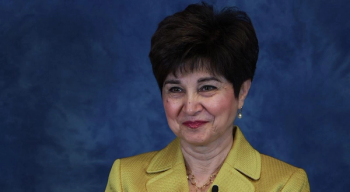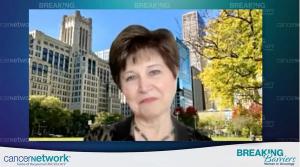
Leaders in genitourinary oncology spoke about key research advances as well as personal experiences in navigating the field.

Your AI-Trained Oncology Knowledge Connection!


Leaders in genitourinary oncology spoke about key research advances as well as personal experiences in navigating the field.

Two women in genitourinary oncology discuss their experiences with figuring out when to begin a family and how to prioritize both work and children.

Over the past few decades, the prostate cancer space has evolved with increased funding for clinical trial creation and enrollment.

This video examines clinical and genomics data from the NCI 9012 trial, which studied abiraterone combined with a PARP inhibitor in patients with metastatic castration-resistant prostate cancer.

We will review how PARP inhibitors function as a class, review the molecular features that sensitize cancer cells to this therapy, and discuss the data supporting its potential for patients with prostate cancer.

This review will discuss recently FDA-approved agents for advanced prostate cancer and those under investigation in phase III trials.

Bladder cancer is the fifth most common cancer diagnosed in theUnited States. Prognosis for this disease is dependent on both tumorstage and grade. Radical cystectomy has been the standard treatmentfor muscle-invasive local disease; however, combined-modality approacheswith the use of chemotherapy are gaining momentum withdata suggesting survival improvement. Patients with metastatic diseasehave poor long-term survival rates despite systemic multiagent chemotherapy.A variety of agents, including newer cytotoxic drugs and biologicallytargeted agents, are under investigation to determine the mosteffective regimen. The special needs of specific patient populations,such as the elderly, those with a suboptimal performance status, andpatients with medical comorbidities have gained more attention.Progress in the treatment of this disease is dependent on supportingongoing and future clinical trials.

The changing clinical dynamics of prostate cancer have resulted in a broadening of the research focus of the Genitourinary (GU) Cancer Committee of the Southwest Oncology Group (SWOG). Beginning with an emphasis on hormone-refractory disease in its early years, SWOG prostate cancer trials now cover the entire spectrum of the disease: localized, locally advanced, metastatic and hormone-refractory disease. As the world's largest GU cancer research group, the GU committee of SWOG has pioneered studies in combined androgen therapy for metastatic disease, quality-of-life (QOL) assessments for patients with localized and advanced disease, adjuvant therapy models, and prostate cancer chemoprevention. The committee has also formed the GU Global Group, whose purpose is to convene the chairs of the GU committees of all the major national and international oncology cooperative groups. Meeting semiannually, this group discusses activities within their respective organizations, plans collaborative strategies and protocols, and establishes global strategy in prostate cancer clinical research. The future directions of national and international prostate cancer trials will build on this broad foundation of well-conceived, logically sequenced studies. [ONCOLOGY 11(8):1155-1170, 1997]

Quality of life of patients undergoing androgen deprivation is an issue that has received limited attention in the past but is currently being actively evaluated in clinical trials. This issue becomes more important as patients with longer life expectancy and no metastatic disease are treated for longer durations.

Published: April 3rd 2024 | Updated:

Published: April 2nd 2024 | Updated:

Published: September 1st 1996 | Updated:

Published: August 1st 1997 | Updated:

Published: May 15th 2011 | Updated:

Published: September 1st 2005 | Updated: